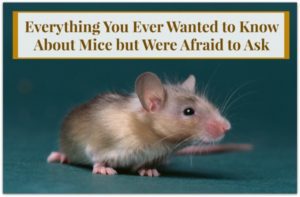Solving the Mice Problem in Maryland

Mice get into homes through cracks and holes, and many of the entryways they use become bigger home problems if the mice are not eliminated. Brody Brothers, Maryland’s top pest control company, warns homeowners that the cooler fall and winter weather will encourage the infestation of mice in walls and homes.
Habits of the House Mouse
- Mice eat up to 20 times a day, which is one of the reasons they choose to live near or in peoples’ homes in the winter.
- Mice will eat any human food that is available, including household materials like soap.
- They are acrobatic and can get almost anywhere in a home. They can even swim.
- Look for droppings, wood damage from chewing, and nests made of shredded soft materials to detect a mouse infestation in the home.
- The nesting area also has a distinct smell.
- In the wild, the life expectancy of a house mouse is only around 5 months to a year, but that’s plenty of time for them to spread hundreds of human pathogens.
- The reproductive patterns of mice are fast, and can begin when a mouse is 2 months old.
- They can have as many as 10 or 12 babies every month after.
- Add their untrained bathroom habits to the equation and you’re looking at a serious health hazard.
Control and Prevention of Mice
- Cats are one method of pest control in Maryland. However, cats that get food elsewhere may choose not to prey on mice in the home. Further, cats may not be able to access all of the hiding spots and travel paths mice may take, such as in the ceiling or behind baseboards.
- If non-venomous snakes are around, they will also eat mice, but they may complicate infestation problems if they get into your home. Adding in the facts that the capture rate would be unpredictable and many homeowners try to discourage snakes from their property, this is often not a reliable method of pest removal.
- Sanitation is an important method of preventing mouse contamination until the infestation is eliminated. Good sanitation can diminish their food sources and shelter areas while you focus on extermination.
- Mousetraps are sometimes effective, but they leave homeowners with the job of disposing of the bodies. Some pathogens carried by mice can be transmitted after death. Be sure to always wear gloves when cleaning up after mice in the home or disposing their bodies. Poison can also be effective, but is not recommended if you have small children or other animals that may ingest it.
Time to Call in the Professionals
The best option for prevention and control of house mice in Maryland is a pest control service that provides safe and effective methods for preventing infestations in the future and exterminating existing mice. Contact Brody Brothers to learn more about mice and prevent these uninvited guests from invading your home this winter season.

